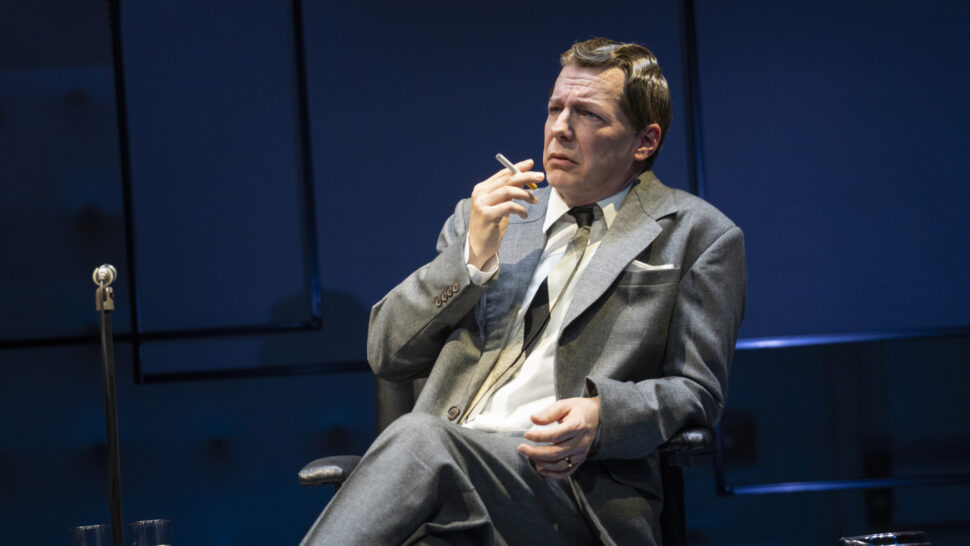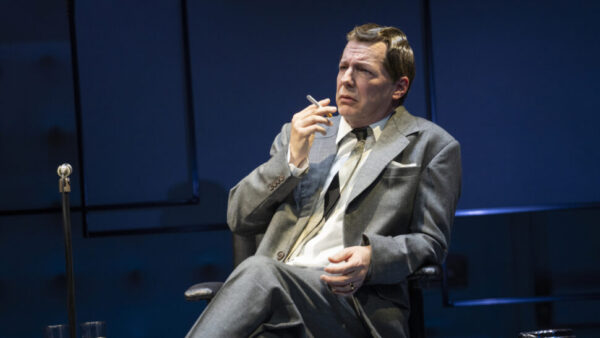
26 Apr TIO NYC: Two Singular Sensations!
“Roses are red, violets are blue, I am a schizophrenic, and so am I.” or, “What the world needs is geniuses with humility. There are so few of us left.” Both quotes by the once legendary Oscar Levant, Hollywood actor, concert pianist, and the most subversive mind to show up on TV during its Golden Age.
Levant is reincarnated in “Good Night, Oscar,” now up at the Belasco Theatre, 111 West 44 street, in the form of producer and Emmy Award-winning star of “Will & Grace.” As it turns out, Sean Hayes is also a classically trained, concert-level pianist. Don’t miss it, if only for Hayes’ bravura performance. Tickets here.
And, at the New Museum, we found the estrogen-laced works of Wangechi Mutu. In brief, the artist explores camouflage, transformation, and mutation in works across mediums, saying smart things simply, in part, by collapsing universal myths over time and invoking feminism without a trace of finger-wagging. Think of the show as Mutu in Wonderland. Through early June, 2023.
Go here for more on TIO NYC.

Sean Hayes ass Oscar Levant in “Good Night Oscar,” image, Joan Marcus.
“Oscar Levant, humorist and pianist, has been enlivening the West Coast video scene for some time with his well-publicized psyche. Very early yesterday morning on the Jack Paar show he put his neuroses and his wit on the National Broadcasting Company’s network and, now his id is a coast-to-coast matter,” wrote the New York Times on November 7, 1958.
The media event in question sets the stage for “Good Night Oscar,” written by Doug Wright and directed by Lisa Peterson.
The year is 1958, and Jack Paar (Ben Rappaport) hosts the most-watched, late-night talk-show on TV, which just decamped to the Left Coast in time for the rating-grabbing “sweeps” period. The suave, smooth, increasingly naughty Paar has invited his favorite guest for the evening, the chain-smoking, wise-cracking and constantly twitching OCD guest, Levant, knowing there will be verbal fireworks from that renowned wild card.
The episode proves to be one Paar’s audience — and the American public— would not soon forget. Much to the chagrin of NBC boss Bob Sarnoff (Peter Grosz), nailing it as a suit with a starched attitude who lives in fear of the wrath of the Catholic League of Decency and the white-picket fenced America of the 1950s in general.
Levant (1906-1972) built a reputation (for better, but all too often for worse), as second banana to Gene Kelly and Fred Astaire in movies such as “An American in Paris” and “The Band Wagon.” But more importantly, he was the chief interpreter of George Gershwin, (a dapper ghost of man played by John Zdrojeski). Gershwin was Levant’s insistent muse and a prime source of his frustration. The man loved playing Gershwin, but it also drove him nuts because none of his own music ever made it into the American Songbook.
Although only in his 50s when the episode in question aired, Levant was a physical and psychological mess, addicted to prescription drugs and cigarettes, and recently sprung by his wife June (Emily Bergl, sweet and spicy, tender and fierce) from a psychiatric hospital (Cedars Sinai) where he was having electro-shock therapy.
In one scene Levant/Hayes explained he has just had a great sessions with a new shrink – only to find out the guy was just another patient “with delusions of grandeur. Truth is, I got off easy. He told the gals in the women’s ward he was a gynecologist.”
What does he do for exercise, Paar asked Levant. “I stumble, then I fall into a coma.”
Then there was the notorious Arthur Miller/Marilyn Monroe joke about the blonde bombshell converting to Judaism for her hubby: “Now that she’s kosher, he can eat her.”
Remember these were Eisenhower days.
And so on…
In the end “Good Night,Oscar” explores the nexus of humor and heartbreak, the thin line between madness and genius, between exploitation and entertainment – and the high price of baring one’s soul before a leering, sneering public.
Still, in the end, it all comes down to Hayes, all jowly and slumped Eeyore shoulders, incarnating that chain-smoking black hole of a man – while ultimately nailing a rendition of “Rhapsody in Blue.”
“Padded walls aside, this is a play that will resonate for years to come,” said TheatreMania.
“Hayes’ piano solo… ranks as the show’s highlight, but aside from a few lulls in the early stages of exposition, before Hayes makes another memorable entrance, the entire play is delightful, buoyed by its leading man’s performance.
“‘I’m controversial! People either dislike me or hate me,’ Hayes as Levant quips, another of Levant’s reworked old jokes. While Hayes’ Levant is an acerbic, self-destructive, sad-sack of a human being, there’s nothing to hate or even dislike about him. Or ‘Good Night, Oscar.’ Sean Hayes is just too easy to love,” raved Entertainment Weekly.
We second that emotion…
New Museum: “Wangechi Mutu: Intertwined.”

Image, courtesy The New York Times
Down this particular rabbit hole, “Intertwined” features over 100 mystical, magical works from across the artist’s 25-year career including painting, collage, drawing, sculpture, film, and performance.
According to the New Museum;
Mutu first gained acclaim for her collage-based practice exploring camouflage, transformation, and mutation. She extends these strategies to her work across various media, developing hybrid, fantastical forms that fuse mythical and folkloric narratives with layered socio-historical references.
“Wangechi Mutu: Intertwined” traces the connections between recent developments in the artist’s sculptural practice and her decades-long exploration of the legacies of colonialism, globalization, and African and diasporic cultural traditions.
At once culturally specific and transnational in scope, Mutu’s work grapples with contemporary realities, while proffering new models for a radically changed future informed by feminism, Afro-futurism, and interspecies symbiosis.
Roberta Smith of The New York Times reviews the show here. writing, for starters: “The multimedia artist transforms the New Museum into a fabulous sphere of creatures where divisions of gender, race and species do not apply.”


Sorry, the comment form is closed at this time.